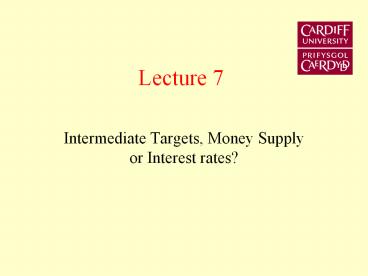Intermediate Targets, Money Supply or Interest rates? - PowerPoint PPT Presentation
Title:
Intermediate Targets, Money Supply or Interest rates?
Description:
Lecture 7 Intermediate Targets, Money Supply or Interest rates? Examine the problems related to the pegging of the rate of interest Examine Friedman s argument in ... – PowerPoint PPT presentation
Number of Views:72
Avg rating:3.0/5.0
Title: Intermediate Targets, Money Supply or Interest rates?
1
Lecture 7
- Intermediate Targets, Money Supply or Interest
rates?
2
- Examine the problems related to the pegging of
the rate of interest - Examine Friedmans argument in the context of
adaptive expectations. - Confirm the Sargent- Wallace finding for the
instability of an interest rate peg with rational
expectations - Show that an interest rate target is feasible
under RE
3
The Friedman critique of interest rate pegging
- Friedman showed that pegging the rate of interest
leads to instability of inflation and output - The argument owes a lot to Thornton (1806) and
Wicksell - A positive real shock can lead to accelerating
inflation and above capacity growth.
4
The model
- Let m money, y output, r real rate of
interest, R nominal rate of interest and ?
rate of inflation (?e expected inflation) - R r ?e
- Let the demand for money be given by md - p
y - ?R - Let the IS curve be y -?r
- Let the Phillips curve be ? ?(y-y) ?e
5
Instability of of the interest rate peg with
Adaptive Expectations
6
A dynamic analysis- let R R
7
A positive IS curve shock
R
LM
R
IS(?e)
ISu
IS
Y
Y
8
Sargent Wallace confirm the same result with RE
- Should the monetary authorities use the interest
rate or the money supply as its instrument of
control? - It depends on the flexibility of prices and
relative magnitudes of demand (real) versus
nominal shocks - SW show that if money is the instrument of
control, there is a determinate price level - If R is the control variable, there is not.
9
The S-W Rational Expectations Model
10
Price level is determined
11
If R is pegged - P is indeterminate
12
McCallum (1981) (1986)
- If the monetary authorities follow an interest
rate rule, it is possible to obtain a determinate
price level. - mt m a(Rt-R)
- In a simple model with a forward expectations IS
curve and a LM curve and a price surprise supply
curve. - There is a deterministic solution and a
stochastic solution
13
Monetary Policy - intermediate targets
- The role of monetary policy in a stochastic
environment - The intermediate target - money supply or
interest rate to stabilise output? - When is the money supply the most appropriate
intermediate target? - When the interest rate?
- When a combination?
14
Assumptions
- Authorities know the structure of the economy
- Uncertainty is additive
- Shocks to the IS curve are given by u and E(u)
0 and E(u)2 ?2u - Shocks to the LM curve are given by v and E(v)0
and E(v)2 ?2v - The price level is fixed and we are in the
short-run
15
IS-LM Model
- IS Schedule y y0 - ?R u
- LM Schedule m y - ?R v
- A positive u shifts the IS curve up
- A positive v shifts the LM up to the left.
16
u, v gt 0
LMv
R
LM
ISu
IS
y
17
Solving for the equilibrium R and y (eqns 1 2)
18
Loss function LR (R-R)2
19
Minimising the loss function
20
The variance of output
21
With an interest rate intermediate target
22
R with only IS shocks
R
R
ISu
IS
Y
IS-u
23
R with only LM shocks
LMv
- R
LM
LM-v
R
Y
Y
24
Variance of output with a money supply
intermediate target
25
M with only IS shocks
- R
LM
ISu
IS
IS-u
Y
26
M with only LM shocks
- R
LMv
LM
LM-v
IS
Y
27
If only IS shocks - which is best intermediate
target?
- R
LM
IS-u
R
ISu
IS
Y
28
If LM shocks only - which is best intermediate
target?
- R
LMv
LM
LM-v
R
IS
Y
Y
29
Combination policy
- R
LM if IS shocks only
LM if IS LM shocks
LM if LM shocks only
IS
Y
30
Summary
- Interest rate is best intermediate target if LM
shocks dominate - Money supply is best intermediate target if IS
shocks dominate - Combination policy is superior to both if shocks
come from both IS and LM































